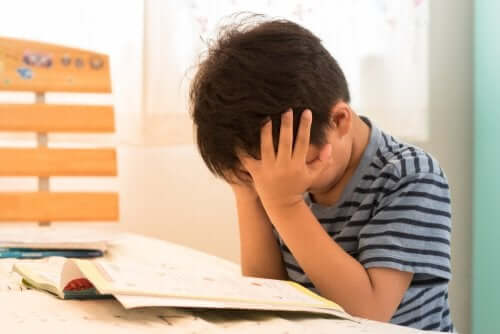Tips for Disorganized Children


Written and verified by the psychopedagogue María José Roldán
When children seem disorganized or easily distracted, sometimes they just need a little help. Keep reading to learn some tips for disorganized children to help them succeed both at school and in life.
Disorganized children
When children are disorganized and distracted, they may have self-esteem issues. The issues may be related to their disorganization and the consequences of their actions.
However, we have to remember that these actions aren’t voluntary. In fact, disorganization seems to be something that people do without even realizing it, and it’s difficult to fix.
Many parents can relate to the feeling of hopelessness when they realize that their child, once again, has forgotten to do a task. We all know that children can be very disorganized.
By learning the basics of being organized, learning to manage their time, and focusing on attractive and achievable goals, children can get back on track. As a result, they’ll start performing better at any academic level and in life as well.

Tips for disorganized children
Getting your child organized can seem like a daunting task. However, you should know that it’s actually as easy and putting things all in one place. Having a folder for each topic and keeping things in one place really reduces the anxiety of not knowing where something is.
Also, you can follow these tips for disorganized children:
- Have a folder for each topic. This will help your child separate what they’re working on, both in their minds and physically. As a result, they’ll be saving time and energy.
- Tab separators for each subject. Use these items to separate your notes, assignments, handouts, tests or quizzes, and loose-leaf paper.
- Written planner. For teens, and especially tweens, using a written homework planner will be very helpful. These planners will help them remember things.
- A kitchen timer. This is for the kids who need to take their time more seriously. You can set the timer for 20-40 minutes, which will be the time they need to do work. Then, they can take a short break before getting back to work. Every child is different in terms of how long they can focus on their work before needing a break.
Let’s face it: most kids would rather have their wisdom teeth removed than organize their folders and backpacks with their parents (and I’m sure you’re thinking you would as well).
However, the key to academic success lies in these organizational tools and how your child uses them. In addition, you have to start giving them responsibilities and ensure they’re being consistent in their new organizational methods.
Ideal homework environment for disorganized children
Text messages, Facebook, video games… these are all constant streams of entertainment (and distractions) that our children have access to at all hours of the day.
As adults, we tend to forget how many distractions little ones have these days. Therefore, an ideal work environment is free from technological distractions.

However, for some children, sitting alone in a quiet room for an extended period of time will make them more likely to make paper airplanes than to complete their homework.
Not all children need absolute silence. Therefore, it’s important to figure out what works best for your child. Some children like to be in the kitchen because they know their mom will be around.
A large table or desk with space to spread out books and papers is the ideal place to do homework. On the other hand, a place in the bedroom, especially in bed or near it, is less ideal because that should only be where your child rests.
Your child’s style and circumstances
Adults sometimes inadvertently put struggling students together in the same group. However, it’s important to recognize each child’s particular traits, needs and tendencies. Remember, they’re individuals. Nobody likes labels, although sometimes it does help to name certain things if they will help you identify the problem.
It’s necessary to understand where your child struggles. For example: Are they a procrastinator? Are they overwhelmed? If your child has difficulties, the best thing to do is figure out the root cause, and how to help them adapt their skills. In addition, it’s important to help them adapt their time management, homework, writing, and studying skills, as well as to highlight their strengths.
In addition to finding study habits and academic goals that work for them, another one of our tips for disorganized children is setting life goals that interest them. It’s essential to motivate children to figure out what they’re passionate about, and find success outside of school.
When children seem disorganized or easily distracted, sometimes they just need a little help. Keep reading to learn some tips for disorganized children to help them succeed both at school and in life.
Disorganized children
When children are disorganized and distracted, they may have self-esteem issues. The issues may be related to their disorganization and the consequences of their actions.
However, we have to remember that these actions aren’t voluntary. In fact, disorganization seems to be something that people do without even realizing it, and it’s difficult to fix.
Many parents can relate to the feeling of hopelessness when they realize that their child, once again, has forgotten to do a task. We all know that children can be very disorganized.
By learning the basics of being organized, learning to manage their time, and focusing on attractive and achievable goals, children can get back on track. As a result, they’ll start performing better at any academic level and in life as well.

Tips for disorganized children
Getting your child organized can seem like a daunting task. However, you should know that it’s actually as easy and putting things all in one place. Having a folder for each topic and keeping things in one place really reduces the anxiety of not knowing where something is.
Also, you can follow these tips for disorganized children:
- Have a folder for each topic. This will help your child separate what they’re working on, both in their minds and physically. As a result, they’ll be saving time and energy.
- Tab separators for each subject. Use these items to separate your notes, assignments, handouts, tests or quizzes, and loose-leaf paper.
- Written planner. For teens, and especially tweens, using a written homework planner will be very helpful. These planners will help them remember things.
- A kitchen timer. This is for the kids who need to take their time more seriously. You can set the timer for 20-40 minutes, which will be the time they need to do work. Then, they can take a short break before getting back to work. Every child is different in terms of how long they can focus on their work before needing a break.
Let’s face it: most kids would rather have their wisdom teeth removed than organize their folders and backpacks with their parents (and I’m sure you’re thinking you would as well).
However, the key to academic success lies in these organizational tools and how your child uses them. In addition, you have to start giving them responsibilities and ensure they’re being consistent in their new organizational methods.
Ideal homework environment for disorganized children
Text messages, Facebook, video games… these are all constant streams of entertainment (and distractions) that our children have access to at all hours of the day.
As adults, we tend to forget how many distractions little ones have these days. Therefore, an ideal work environment is free from technological distractions.

However, for some children, sitting alone in a quiet room for an extended period of time will make them more likely to make paper airplanes than to complete their homework.
Not all children need absolute silence. Therefore, it’s important to figure out what works best for your child. Some children like to be in the kitchen because they know their mom will be around.
A large table or desk with space to spread out books and papers is the ideal place to do homework. On the other hand, a place in the bedroom, especially in bed or near it, is less ideal because that should only be where your child rests.
Your child’s style and circumstances
Adults sometimes inadvertently put struggling students together in the same group. However, it’s important to recognize each child’s particular traits, needs and tendencies. Remember, they’re individuals. Nobody likes labels, although sometimes it does help to name certain things if they will help you identify the problem.
It’s necessary to understand where your child struggles. For example: Are they a procrastinator? Are they overwhelmed? If your child has difficulties, the best thing to do is figure out the root cause, and how to help them adapt their skills. In addition, it’s important to help them adapt their time management, homework, writing, and studying skills, as well as to highlight their strengths.
In addition to finding study habits and academic goals that work for them, another one of our tips for disorganized children is setting life goals that interest them. It’s essential to motivate children to figure out what they’re passionate about, and find success outside of school.
This text is provided for informational purposes only and does not replace consultation with a professional. If in doubt, consult your specialist.








